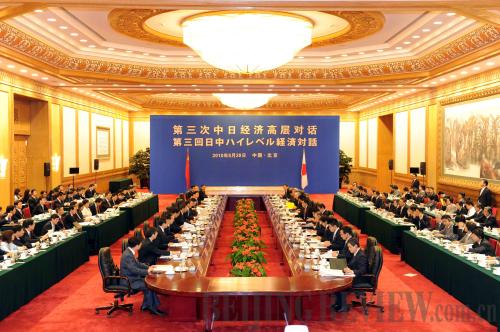|
 |
|
FACE TO FACE: Chinese and Japanese officials attend the third China-Japan high-level economic dialogue in Beijing on August 28 (RAO AIMIN) |
China and Japan are set to strengthen cooperation in the areas of high-end manufacturing, energy conservation, environmental protection, communications and product quality management.
These fields were prioritized by Chinese Vice Premier Wang Qishan at the third China-Japan high-level economic dialogue in Beijing on August 28. The two sides, headed by Wang and Japanese Prime Minister Katsuya Okada, also signed seven agreements concerning fields like logistics, forestry and food safety.
The high-level economic dialogue, jointly proposed by Chinese Premier Wen Jiabao and former Japanese Prime Minister Shinzo Abe, was first convened in Beijing in December 2007. The second meeting was held in Tokyo in June 2009.
"Bilateral trade between China and Japan has recovered and exceeded the level before the financial crisis," Wang said, adding this proves the robust momentum of China-Japan economic cooperation.
Okada also underlined the importance of Sino-Japanese economic ties. A closer partnership between China and Japan would help not only guarantee the two economies' sustainable growth, but also promote peace and stability in the Asia-Pacific region and beyond, he said.
The dialogue was held shortly after the Japanese Government announced China's second-quarter GDP exceeded Japan's. Although China's GDP in the past half year was lower than Japan's, economists predict that China's total 2010 GDP will be the world's second largest, just behind the United States.
Wang pointed out Japan also has benefited from the rapid growth of the Chinese economy. At its core, he added, the China-Japan economic relationship is "mutually beneficial and win-win."
Japan's economy relies heavily on external demand and, since exports to the European and U.S. markets are slipping, the country is hoping to capitalize on China's rapid economic growth to get past the economic crisis. Recently, the Japanese yen appreciated sharply against the U.S. dollar, placing more pressure on Japanese exports and posing a new challenge to the country's economic recovery.
In this context, the two countries need to explore new areas of cooperation. By the end of April, Japanese investment in China had totaled $71 billion, making it China's second largest foreign investor. Japan is hoping for further investment opportunities in China.
China is now trying to upgrade its labor-intensive industries to capital- and technology-intensive ones. It considers the energy conservation and environmental protection industries, which are projected to generate an annual turnover of 2.8 trillion yuan ($411.7 billion) by 2012, as emerging industries of strategic importance. To boost the development of these industries, it will inevitably need foreign capital and advanced technology.
China and Japan will cooperate in the areas of energy conservation, energy efficiency improvement, renewable energy technology and carbon capture and storage, as well as adaptation to climate change, said Zhang Ping, Chairman of China's National Development and Reform Commission.
The two countries have held four energy conservation and environmental protection forums and inked a total of 76 agreements in this area. A fifth forum will be held in Tokyo this October, as decided at the third high-level economic dialogue.
Both governments support the two countries' companies working jointly on energy conservation demonstration projects, Zhang said. China has sent 300 managerial personnel to Japan to study energy conservation policies and technology.
China has huge market potential as it undergoes rapid industrialization and urbanization, said Vice Premier Wang. It will create a positive investment environment for foreign investors by sticking to its opening-up policy.
The third China-Japan high-level economic dialogue, which helped enhance mutual understanding and trust, showed the increasing maturity of the Sino-Japanese economic relations, he said. | 